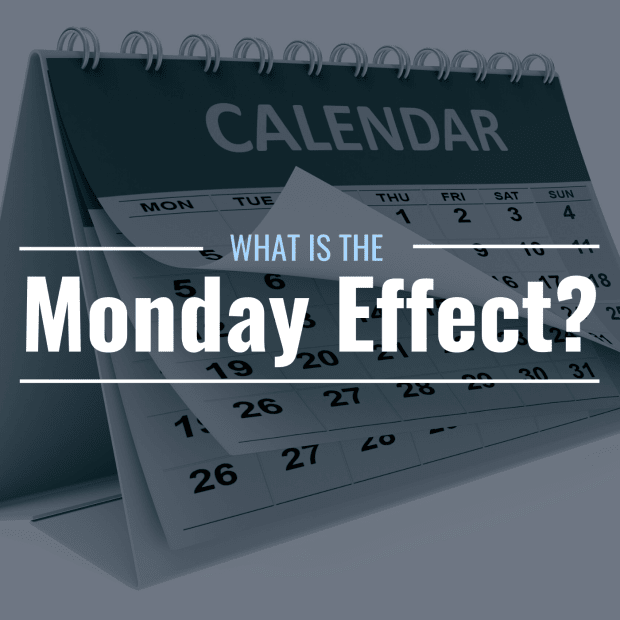
omendrive from Getty Images; Canva
Everyone knows it’s impossible to time the stock market, but some investors think there’s a way to predict its future performance based upon each Friday's market close.
What Is the Monday Effect?
The Monday effect is a market theory from the 1970s. It suggests that whatever the pricing action of a stock market index like the Dow Jones Industrial Average (DJIA) or S&P 500 is at the closing bell on Friday, the same action will continue when the market reopens the following Monday (the markets are closed over the weekend).
For example, if the Dow had a spectacular day on Friday, this effect suggests that Monday would see gains as well. But if the Dow ended the week on a down note, it would trade lower the following Monday.
A Brief History of the Monday Effect
The Monday effect, along with other theories like the weekend effect, was not witnessed on the trading floors; rather, it came from data mined by academics.
In 1973, Frank Cross published an article in the Financial Analysts Journal entitled “The Behavior of Stock Prices on Fridays and Mondays.” In it, he examined the relationship between price changes on the New York Stock Exchange between the 844 sets of Fridays and Mondays between 1953 and 1970.
Cross discovered that, during that period, Friday was the best performing day for the S&P 500, rising 62% of the time (523 days), while Monday was the worst, rising just 39.2%.
He also noted that over the same 523 “up” Fridays, the S&P 500 made further gains on the following Monday 49% of the time.
However, an even more apparent correlation took place when the S&P 500 closed “down” on Friday. In the 313 cases where that happened, the odds were 3:1 that the stock index would also decline on Monday.
Cross made note that these results were deduced with statistically significant probabilities and that, in his research, there was a recurrence of the average return from Friday to Monday.
What Causes the Monday Effect?
Proponents of the Monday effect provided several reasons why the stock market’s action on Monday could mirror the Friday close.
- Short sellers often covered their positions on Fridays because the markets were closed over the weekends, leading to negative returns on Mondays.
- Fridays saw unusually high closing prices due to settlement delays, particularly in the 1980s, when it took five business days for a trade to settle. (After a 2017 ruling by the SEC, it now takes just two.)
- Market sentiment was historically lower at the beginning of the week and higher toward the end, as workers anticipated being off for the weekend.
- Even the news cycle had a bias towards Friday, as “bad” news was typically released late on Friday after the markets closed, giving investors time over the weekend to digest it before taking action.
Of course, the Monday effect spells a tremendous opportunity for day traders and momentum investors, as it effectively allows them to “plan ahead” for their Monday trades based on Friday’s market action.
But is it real?
Criticisms of the Monday Effect
Analysts who oppose the Monday effect simply point to the efficient market hypothesis, which states that prices in the stock market always reflect all of the known information at any given time. Therefore, an anomaly like this might be observed for a period of time but cannot be accepted as a universal truth.
Instead, some cite trading volume and volatility as better reasons to explain market behavior, while others point to the many differences in trading patterns between large institutional investors and smaller retail investors.
Perhaps even more importantly, the post-COVID-19 stock market environment is profoundly different from the stock markets of the 1970s. Even the Federal Reserve of Boston weighed in on “urban legends” like these: In its analysis of the Weekend effect, the Fed concluded that any evidence of “drift” spilling over into Monday trading appeared to have disappeared after 1987.
And speaking of, 1987 was the year of one of the most incredible stock market crashes in history, a crash that occurred on a Monday, and which would skew more contemporary analyses if it were included in data sets. Other Monday crashes occurred during the Financial Crisis of 2007–2008 and the COVID-19 pandemic.
Even Frank Cross, the author of the Monday effect, seems to find a better fit for his theory outside the realm of equities. In the 1980s, he co-founded an investment bank called Niederhoffer, Cross & Zeckhauser, where analyses of market inefficiencies were used to engage in commodities speculation. One stomach-churning trade, which grew $30,000 to $12 million, was even featured in The New York Times.
Their work attracted the interest of renowned hedge fund investor George Soros; Frank Cross’ colleague, Victor Niederhoffer, went on to become a partner at Soros Fund Management, and in his book The Alchemy of Finance, Soros said Niederhoffer was the only speculator he knew who retired while ahead.







